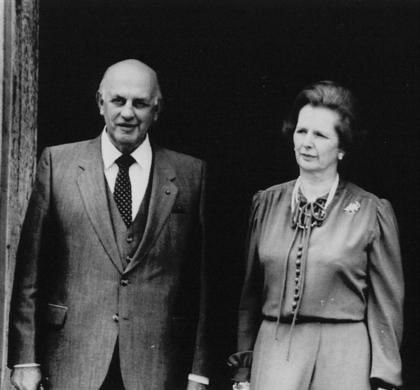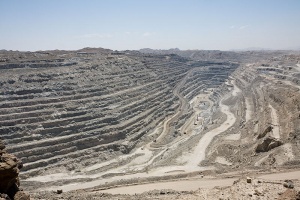Margaret Thatcher
| Founder of | Centre for Policy Studies |
|---|---|
| Member of | Hoover Institution/Fellows, Le Cercle, US/Department/State/International Visitor Leadership Program |
| Interest of | Claire Berlinski, Mont Pelerin Society, Shield |
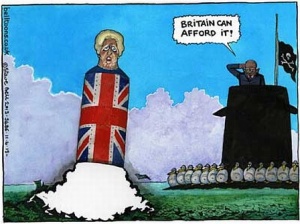
Margaret Hilda Thatcher (born 13 October 1925, died 8 April 2013) was Prime Minister of the United Kingdom from 1979 to 1990 and leader of the Conservative Party from 1975 to 1990. A Soviet journalist called her "The Iron Lady", a nickname which became associated with her uncompromising politics and leadership style. As Prime Minister, she implemented Conservative policies that have come to be known as Thatcherism. Margaret Thatcher (née Roberts) held a life peerage as Baroness Thatcher of Kesteven in the County of Lincolnshire, which entitled her to sit in the House of Lords.
Contents
Invitation to the Bilderberg Group
Denis Healey recalls that he invited Margaret Thatcher to the 1975 Bilderberg conference and that after listening in silence for two days:
"the next day she suddenly stood up and launched into a three-minute Thatcher special. I can't remember the topic, but you can imagine. The room was stunned. Here's something for your conspiracy theorists. As a result of that speech, David Rockefeller and Henry Kissinger and the other Americans fell in love with her. They brought her over to America, took her around in limousines, and introduced her to everyone."[1]
Bilderberg reporter Jim Tucker, attributes her downfall to a decision made at a meeting of the Bilderberg group, because she refused to allowed British sovereignty to be dismantled. When he asked her about it, he reports that she whispered back that she considered it a "great tribute to be denounced by Bilderberg".[2]
UK Prime Minister
In 1979 Margaret Thatcher became the UK's first female prime minister, a position she held until 1990.
Brighton bombing
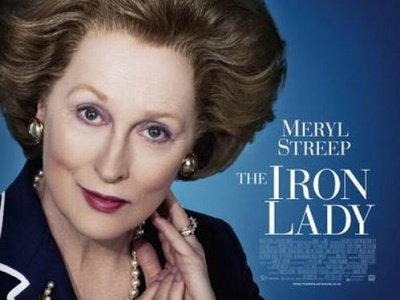
Thatcher escaped death in the Brighton bombing of 12 October 1984, as featured in the film The Iron Lady (for which Meryl Streep won an Oscar and BAFTA's Best Actress award in 2012).
The IRA bomb was planted in the Grand Hotel, Brighton, between 14 and 17 September 1984 and was triggered by a sophisticated long-delay timer.[3] Who supplied the IRA with the timer?
The film makes no mention of the biggest terrorist outrage in Britain: the sabotage of Pan Am Flight 103 over Lockerbie, Scotland, with the loss of 270 lives on 21 December 1988. The Lockerbie trial determined it was the Swiss firm MEBO that supplied Libya with the timer which detonated the Pan Am bomb just 38 minutes after take-off from Heathrow. There is a large body of opinion that disputes this finding, preferring instead to believe that the Lockerbie bomb was triggered by a barometric device.
Was it therefore a case of "if we can't get them for the Brighton bombing, let's frame them for the Lockerbie bombing"?[4]
Conspiracy with Reagan
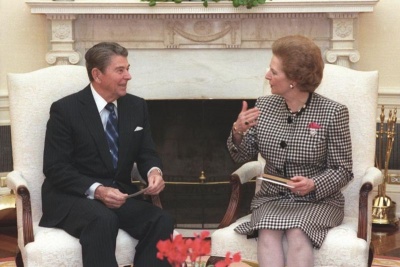
On 2 December 2010, in a video conference link to staff and students at the London School of Economics, Colonel Gaddafi alleged that the case against Abdelbaset Ali Mohmed Al Megrahi had 'been fabricated and created by' Britain's former Prime Minister Margaret Thatcher and former US President Ronald Reagan. He suggested that US CIA officials had been behind the 21 December 1988 Lockerbie bombing in which 270 people were killed.
"These are the people who created this conspiracy" said Gaddafi, referring to the alleged role of Thatcher and Reagan in Megrahi's conviction and life sentence over the attack on Pan Am Flight 103. "The charges directed towards Libya were based on unfounded evidence in an attempt to weaken the Libyan Revolution and limit its resources and abilities".[5]
In making his allegation, Gaddafi did not include ex-President (and former CIA Director) George H W Bush in this conspiracy. This may suggest that if Thatcher and Reagan had indeed 'fabricated and created' the Lockerbie bombing case against Libya, they would have done so in the interregnum between the 8 November 1988 US presidential election and President Bush taking over from Reagan on 20 January 1989.
Gaddafi's alleged Lockerbie conspiracy could well have been hatched on 15 November 1988 when President Reagan and Prime Minister Thatcher were photographed in the White House library and would undoubtedly have discussed Iran's threat to retaliate massively for the shooting down of Iran Air Flight 655 by USS Vincennes on 3 July 1988 with the loss of 290 civilian lives. The two leaders might then have decided to open secret negotiations with Iran and seek to limit the revenge attack to just one US aircraft. The US and UK would not have wanted to antagonise the Iranians further by blaming Iran for the retaliation, so would have selected 'mad dog' Gaddafi to be their whipping boy.
Western Intelligence Agencies (including apartheid South Africa's National Intelligence Service) would have been party to such negotiations and would have had a say in selecting the sacrificial aircraft. Thus on 22 December 1988 (the day after the Lockerbie bombing), President Reagan phoned Downing Street:[6]
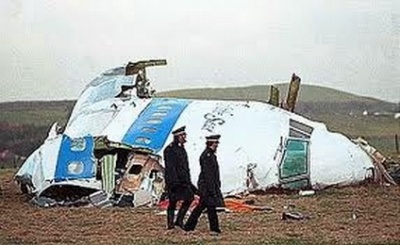
"Margaret, I understand you have just returned from the site of the Pan Am crash. I want to thank you for your expression of sorrow on the Pan Am 103 tragedy. On behalf of the American people, I also want to thank the rescue workers who responded so quickly and courageously. Our thoughts and prayers are with the victims of this accident, both the passengers on the plane and the villagers in Scotland".
On 28 December 1988, seven days after the Lockerbie bombing, when there was as yet no evidence ostensibly pointing to Libyan culpability, in one of the last acts of his Presidency, Ronald Reagan extended sanctions against Libya and threatened renewed bombing raids.[7] The joint US/UK investigation into the bombing soon found 'evidence' pointing towards Libya for the sabotage of Pan Am Flight 103. According to author and journalist, Ian Ferguson, it was a case of 'reverse engineering' whereby Libya had been fitted up for the crime and the inculpatory evidence followed (see the 2009 documentary film Lockerbie Revisited).[8]
South African Relations
Lunch with P W Botha
On 5 June 1984, Prime Minister Margaret Thatcher made a lengthy statement in the House of Commons about the visit to Chequers by the two Bothas, P W Botha and Pik Botha but she omitted any mention of the Coventry Four affair:[9]
"We had over five hours of discussions. I was accompanied by my right hon. and learned Friend the Foreign Secretary and my hon. Friend the Member for Edinburgh, Pentlands (Mr Rifkind), the Minister of State. The meeting was a working one, and the discussions were comprehensive and candid. They covered the problems of southern Africa as a whole, including Namibia. There was considerable discussion of the internal situation in South Africa. I made clear to Mr Botha our desire to see peaceful solutions to all the region's problems. On Namibia, we agreed that early independence for Namibia was desirable and should be achieved as soon as possible under peaceful conditions. We also agreed that all foreign forces should be withdrawn from the countries in southern Africa so that their peoples can settle their destinies without outside interference. The withdrawal of South African forces from Angola is an important first step in this process."
Apartheid Appeaser
Winston Churchill is quoted as saying:[10]
"An appeaser is one who feeds a crocodile, hoping it will eat him last."
As Prime Minister in the 1980s, Margaret Thatcher adopted the role of "Apartheid Appeaser" in relation to the South African regime led by P W Botha who was also known as "Die Groot Krokodil" (Afrikaans for "the Big Crocodile"). While black South Africans were being slaughtered by the apartheid regime, and Margaret Thatcher was calling the ANC a terrorist organisation branding Nelson Mandela a "terrorist", she was doing all she could to block the sanctions which most of the world imposed in response to the barbarity of the regime. "I have found myself to all intents and purposes alone in resisting sanctions," she wrote to "the Big Crocodile" in apartheid South Africa.
Lady Thatcher, the "Apartheid Appeaser", is likely to be mourned by few in South Africa:
- "I say good riddance. She was a staunch supporter of the apartheid regime," ex-minister and ex-ANC activist Pallo Jordan told the Guardian newspaper. Jordan accompanied Nelson Mandela on a visit to London in 1991, which included a meeting with Thatcher. "Although she called us a terrorist organisation, she had to shake hands with a terrorist and sit down with a terrorist. So who won?" Pallo Jordan said.[11]
Prime Minister Thatcher kept on appeasing apartheid South Africa by turning a blind eye to the following terrorist activities of President P W Botha's State Security Council:
- The March 1982 bombing of the ANC office in London
- The assassination of anti-apartheid activist Ruth First in Maputo, Mozambique on 18 August 1982
- The break-in at the London apartment of Socialist International Secretary-General, Bernt Carlsson, in April 1983
- The apartheid regime's possible involvement in the murder of WPC Yvonne Fletcher on 17 April 1984
- The murder of the family of anti-apartheid activist Marius Schoon in Angola on 28 June 1984
- The murder of Sweden's Prime Minister Olof Palme on 28 February 1986
- The murder of President Samora Machel who was killed in an aircrash on 19 September 1986
- The 1987 plan to kidnap the entire ANC leadership in London
- The attempted assassination of ANC representative in Brussels, Godfrey Motsepe, on 4 February 1988
- The murder of ANC representative in Paris, Dulcie September, on 29 March 1988
- The targeting of UN Commissioner for Namibia, Bernt Carlsson, on Pan Am Flight 103 on 21 December 1988
From Chequers to Lockerbie
The distance by road from the Prime Minister’s country residence in Buckinghamshire to the site in Scotland of the Pan Am Flight 103 crash on 21 December 1988 is 310 miles. It took more than 4½ years for President P W Botha to complete the murderous journey from his meeting with Mrs Thatcher at Chequers to the sabotage at Lockerbie:[12]
"Opponents of South Africa's apartheid system have promised Mr P W Botha a ‘hot reception’ when he visits Britain tomorrow (2 June 1984) to lunch with Mrs Thatcher at Chequers. During his trip to Europe, which includes visits to Bonn and Lisbon, Mr Botha will be trying to persuade European leaders that South Africa has ‘adapted’ enough to be readmitted into the international community. In November his constitutional changes, which leave the country's 18 million blacks with absolutely no representation, were approved by 60 per cent of the all-white electorate in spite of the opposition of the liberal Progressive Federal Party (PFP). The United States, however, welcomed the new constitution as ‘a step in the right direction’, and it is clear that Mr Botha enjoys the confidence of the Reagan administration. Since the 1980 presidential election, the United States has taken up a position of ‘constructive engagement’ with South Africa, friendly relations in the hope of averting a red revolution in Southern Africa, and also towards the goal of the departure of the Cuban troops in Angola. Mr Botha has taken advantage of this policy to invade Angola with virtual impunity, to bully other neighbouring ‘Frontline’ states, and most recently to bring Mozambique to its knees as 100,000 people died of starvation at the same time as South African-backed terrorists stopped food supplies to drought-stricken regions. The Mozambican president, Samora Machel, was forced to sign the Nkomati Accord and thus expel the ANC, which is committed to the overthrow of apartheid."
(Extract from The Catholic Herald of 1 June 1984.)
"Proud to be British"
Three months after the Lockerbie bombing, Margaret Thatcher and the rising star in Conservative Research Department, David Cameron, visited southern Africa.[13]
The past and future British Prime Ministers made a point of visiting the Rössing Uranium Mine in Namibia (illegally occupied by apartheid South Africa in defiance of UN Security Council Resolution 435). In 1989, the Rössing mine was jointly owned by Rio Tinto Group and the Iranian Government, and was supplying uranium to develop Iran’s nuclear programme. Mrs Thatcher was so impressed with the Rössing Uranium Mine that she declared it made her "proud to be British", a sentiment echoed by David Cameron.[14]
In April 2010, it was reported that Margaret Thatcher and David Cameron concluded a secret nuclear deal with the apartheid regime in 1989, whereby £17.8 million was paid into Conservative Party funds in the 1990s.[15]
Post Resignation
Philip Morris
In 1992 Margaret Thatcher signed on as an international consultant to the Philip Morris tobacco company at a pay rate of US $500,000 annually, with half to be paid directly to Mrs Thatcher and half to be paid to the Margaret Thatcher Foundation.[16] The Independent reported that Philip Morris paid for a 70th birthday bash for Mrs Thatcher on 23 October 1995 in Washington, D.C. with 800 guests attending and at an estimated cost of $1 million.[17]
Tax Loophole Exploitation
In an article in 2002 on the subject of how 'Rich people are costing Britain millions in lost tax by not registering their houses in their own names', the Guardian[18] reports that Thatcher's home in Chester Square, London was registered as owned by Bakeland Property Ltd, Jersey. It was acquired in 1991 and Thatcher has it on 64 year lease. The shares for Bakeland Property Ltd are held by two Jersey individuals (Leonard Day and Hugh Thurston) who are the Thatcher family's financial advisers. According to the report, they are 'acting as nominees for a trust with concealed beneficiaries'. The former prime minister's office is reported to have refused to explain why she does not apparently own her own house. Leonard Day in Jersey is reported to have said: "No one's going to tell you about that." The article claims that through the exploitation of legal loopholes 'wealthy individuals... appear to be enjoying the country's choicest property virtually tax-free'. The article also mentions Anthony Tabatznik, Mohamed Al Fayed, David Potter, Tony Tabatznik, Lakshmi Mittal, Uri David, Rupert Allason, Wafic Said, Prince Bandar and Christopher Ondaatje as others who are not the registered owners of their homes who may benefit from such a loophole.
Thatcher's home was estimated to be worth at least £2.5m. As she was not the registered owner she has potentially avoided at least £100,000 in stamp duty and £900,000 in inheritance tax.[19]
Death
Thatcher died on 8 April 2013. That day a Buckingham Palace spokesman said: "The Queen was sad to hear the news of the death of Baroness Thatcher. Her Majesty will be sending a private message of sympathy to the family."[20] Lady Thatcher's ceremonial funeral with a "Falklands War theme" at St Paul's Cathedral in London on 17 April 2013 has been estimated to cost £10 million.[21]
Affiliations
- Centre for Policy Studies, co-founder
- APPG, vice president
Appointments by Margaret Thatcher
| Appointee | Job | Appointed | End | Description |
|---|---|---|---|---|
| Percy Cradock | UK/Joint Intelligence Committee/Chair | 1985 | 1992 | |
| Nicholas Fairbairn | Solicitor General for Scotland | 1979 | 1982 | Also UK/VIPaedophile |
| Peter Fraser | Solicitor General for Scotland | 1982 | 1989 | |
| Michael Havers | Lord Chancellor | 13 June 1987 | 26 October 1987 | |
| Michael Havers | Attorney General for Northern Ireland | 6 May 1979 | 13 June 1987 | |
| Michael Havers | Attorney General for England and Wales | 6 May 1979 | 13 June 1987 | |
| Ian MacGregor | British Steel Corporation/Chairman | 1980 | 1983 | Paid |
| Ian MacGregor | National Coal Board/Chairman | 1983 | 1986 | During the Miners' Strike |
Related Quotations
| Page | Quote | Author | Date |
|---|---|---|---|
| Tony Blair | “Thatcher deliberately and cruelly wrecked the social democratic society in which I grew up, with the aim of destroying any ability for working people to be protected against the whims of the wealthy. But Thatcher never introduced privatisation into the NHS or state schools – that was her acolyte Blair. She maintained free university education in England and Wales. That was destroyed by Blair too.” | Craig Murray Tony Blair | 25 July 2019 |
| Yuriko Koike | “I have received the enthusiastic support of my colleagues. In order to break through the deadlock facing Japanese society, I believe the country might as well have a female candidate. Hillary used the word 'glass ceiling' ... but in Japan, it isn't glass, it's an iron plate. I'm not Mrs. Thatcher, but what is needed is a strategy that advances a cause with conviction, clear policies and sympathy with the people."” | Yuriko Koike | 8 September 2008 |
| Leader of the Conservative Party | “All Tory leaders have surrounded themselves with an inner circle, which has given them ballast and in certain important respects defined their leadership. John Major had a winning fondness for palpable fakes, like Jeffrey Archer and David Mellor; Margaret Thatcher liked hirsute North London entrepreneurs with a ‘can-do’ attitude and heavy jewellery. Michael Howard’s chosen milieu is constructed of dapper, well-spoken men and women, many of whom live within walking distance of one another in west London. Cameron is unmistakably the leader of these Notting Hill Tories, but others include Michael Howard’s political secretary Rachel Whetstone, his speechwriter Ed Vaizey, marketing expert Steve Hilton, policy man Nick Boles, along with the newspaper columnists Edward Heathcoat Amory and his wife Alice Thomson.” | Peter Oborne | 19 June 2004 |
Events Participated in
| Event | Start | End | Location(s) | Description |
|---|---|---|---|---|
| Bilderberg/1975 | 25 April 1975 | 27 April 1975 | Turkey Golden Dolphin Hotel Cesme | The 24th Bilderberg Meeting, 98 guests |
| Bilderberg/1986 | 25 April 1986 | 27 April 1986 | Scotland Gleneagles Hotel | The 34th Bilderberg, 109 participants |
Related Documents
| Title | Type | Publication date | Author(s) | Description |
|---|---|---|---|---|
| Document:How Megrahi and Libya were framed for Lockerbie | article | 22 July 2010 | Alexander Cockburn | |
| Document:How to Keep Going During the Next Energy Crisis | Article | 25 September 2021 | Mike Small | The social chaos unwinding on your forecourts and timelines is the long-term consequence of decades of privatisation, core industries run for profiteering with no thinking about the socio-ecological consequence. As people face mass fuel poverty, the dark irony is that all of these “British” institutions were sold off by the Tories, now desperate to defend the very concept of Britishness they’ve sold. |
| Document:Maggie's Guilty Secret | article | December 2013 | John Hughes-Wilson | A brief resume of the Arms-to-Iraq affair by a former colonel on NATO's international political staff in Brussels. It revisits the abortive rescue of US diplomatic staff held hostage by Iran under President Carter, paving the way for the UK to supply arms to both sides in the soon-to-follow Iran-Iraq war in covert defiance of UN sanctions. The UK establishment has been engaged in a monumental cover-up ever since. |
| Document:Margaret Thatcher Ruined Britain | blog post | 30 December 2021 | Clifford Thurlow | Margaret Thatcher ruined Britain with her hard-right policies and the five Conservative prime ministers, since her party knifed her in the back the Tory way, have carelessly kicked over the remains. Each has been worse than the last in descending order – John Major, David Cameron, Theresa May, liar Boris Johnson and finally Liz Truss, a puppet with a wooden heart and personal photographer. |
| Document:Memo To Prime Minister - Your Merchants of Death Are Cooking The Books | article | 17 October 1980 | Duncan Campbell | |
| Document:PT35B - The Most Expensive Forgery in History | Article | 18 October 2017 | Ludwig De Braeckeleer | Ludwig De Braeckeleer proves that the Lockerbie bomb timer fragment PT/35(b) is a "fragment of the imagination" |
| Document:Pan Am Flight 103: It was the Uranium | article | 6 January 2014 | Patrick Haseldine | Following Bernt Carlsson's untimely death in the Lockerbie bombing, the UN Council for Namibia inexplicably dropped the case against Britain's URENCO for illegally importing yellowcake from the Rössing Uranium Mine in Namibia. |
| Document:The Crime of Lockerbie | Article | 16 August 2009 | Tam Dalyell | Tam Dalyell said: "Yes, I have read 'The Downing Street Years' very carefully. Why in 800 pages did you not mention Lockerbie once?" Mrs Thatcher replied: "Because I didn’t know what happened and I don’t write about things that I don’t know about." |
| Document:The great con that ruined Britain | Article | 3 April 2016 | Peter Hitchens | Peter Hitchens, the repentant Thatcherite, has second thoughts about privatisation: if it’s all been so beneficial, why do so many of the containers that arrive in British ports, full of expensive imports, leave this country empty? |
References
- ↑ "Who pulls the strings?"
- ↑ Streeter, Michael. Behind closed doors: the power and influence of secret societies. p. 169.
- ↑ "Bomb expert links hotel device to Glasgow cache"
- ↑ "The Iron Lady's Revenge?"
- ↑ "Lockerbie bomber's family preparing to sue Britain for false imprisonment"
- ↑ "Reagan phone call to Thatcher at Downing Street"
- ↑ "Exploding Lockerbie – Part 2"
- ↑ "Lockerbie conspiracy by Thatcher and Reagan"
- ↑ Hansard 5 June 1984
- ↑ "Winston Churchill quotation"
- ↑ "Thatcher mourned by few in South Africa"
- ↑ "From Chequers to Lockerbie"
- ↑ "Cameron's freebie to apartheid South Africa"
- ↑ "Rössing Uranium Mine"
- ↑ "How the US and UK 'lost' three nuclear weapons"
- ↑ http://legacy.library.ucsf.edu/tid/tnu34e00
- ↑ http://findarticles.com/p/articles/mi_qn4158/is_19951008/ai_n14010702
- ↑ Evans, R & Hencke, D. (2002) 'Tax loopholes on homes benefit the rich and cost UK millions'. The Guardian 25th May 2002. Accessed 22nd May 2008
- ↑ Rob Evans and David Hencke, "Tax loopholes on homes benefit the rich and cost UK millions: Choice homes, virtually tax free", The Guardian, 25th May 2002
- ↑ "Ex-Prime Minister Baroness Thatcher dies, aged 87"
- ↑ "Guess who is not coming to Margaret Thatcher's funeral"
